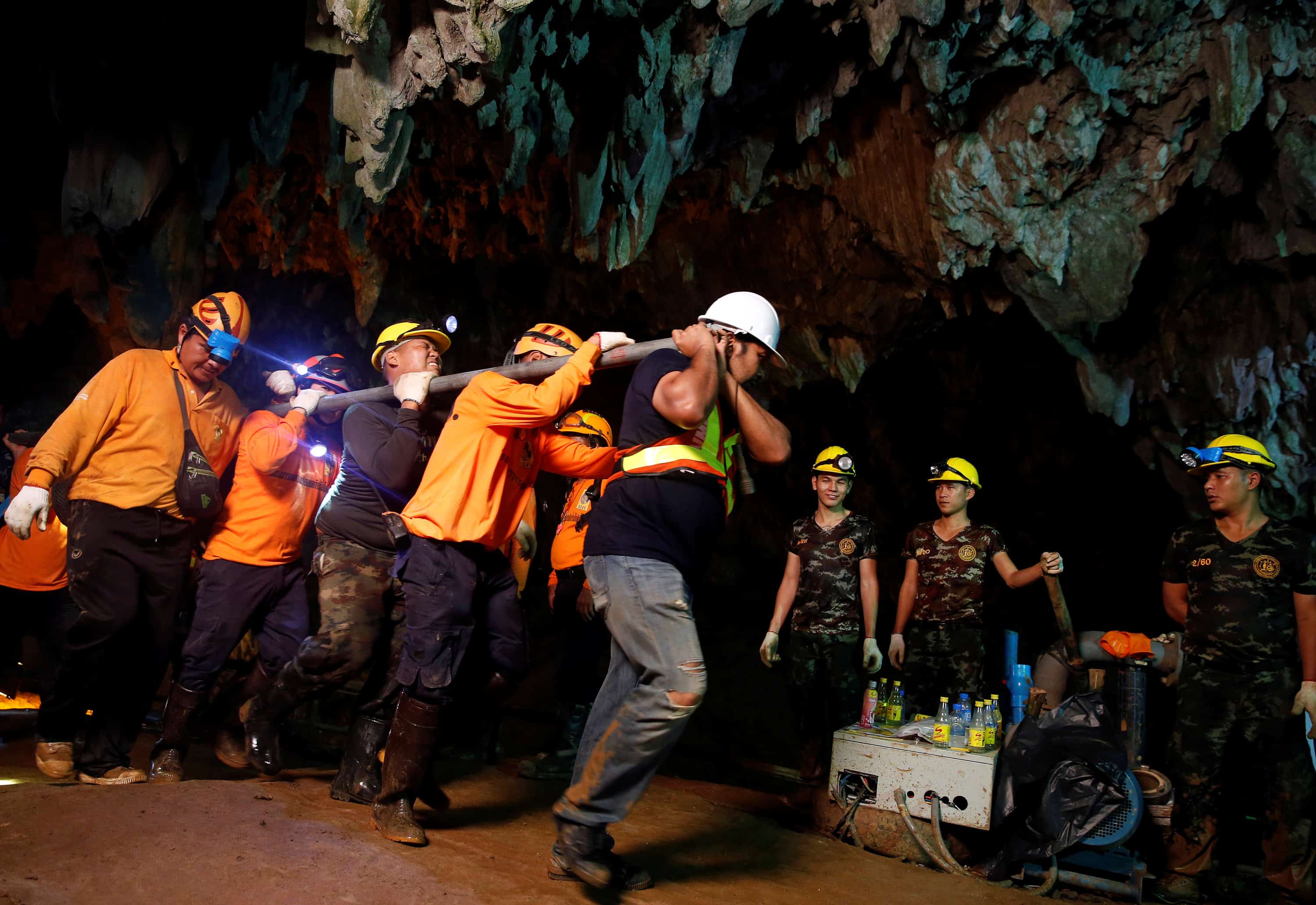When the story began, it appeared as a mere ticker-tape caption scrolling across the bottom of the screen: 12 young boys and their coach lost in the caves of Thailand. It was yet another tragedy which faded into the background noise of negative news.
But then, in a quick explosion of events the headline read: WE FOUND THEM!
Nearly three miles from the cave entrance, the twelve boys and their coach were found huddled together hungry, scared, desperate but alive. In some ways it was a miracle—they’d survived!—but a greater miracle happened shortly thereafter.
Think about the dominance the Thai soccer team held over our national and international attentions—their story was everywhere: CNN, Fox News, MSNBC, The New York Times, The Washington Post, etc… It wasn’t just the miracle of their rescue, which was shocking enough, but there was a tonal difference in our conversations. For a brief week this summer, the coverage was positive and hopeful.
Watching and waiting for good news, we turned our attentions to accompanying one another with a sense of hope. The conversation highlighted the “heroes” coming together offering their time and expertise to the rescue. At one point, Elon Musk stepped out of line from this tendency by claiming to have the answer with his one-man submarine. But instead of being critical of his outlandish idea or dismissive of him, the news coverage in that moment hinted to an underlying presumption: despite being arrogant in his assertions, Musk was genuinely trying to find a way to rescue the boys. It was the same thing we all hoped for.
Civility dominated as experts disagreeing with different methods of rescue still held a common, core value: the value of these thirteen lives. The daily loops of the news cycle were interrupted by each development of the story and each joyful announcement: another one has been rescued from the cave! Regardless of political or even national affiliations, the commentators unanimously celebrated the news and expressed concern over the health and recovery of these children and their coach.
And there was a miracle of a different kind: We all changed our default setting of criticism into hope.
That moment feels important. It feels like it matters in the sense of our collective identity and the hope that we share with one another. It came upon us as a burst of energy, eclipsing the negativity and criticism which fills our daily news. It reminded us of the hope and goodwill of humankind that is shared somewhere deep within us. In essence, it was a miraculous moment of grace—a moment where God’s hands reach down into our world with an invitation.
But Where Do We Go from Here?
As with any moment of grace, the question which follows is important: what do we do with that grace? How do we allow it to affect us, and how do we allow it to transform us?
We return to a news cycle which paints nearly all stories as adversarial, but maybe this miraculous moment of grace can inspire us to do something different. Here are a few practical ideas for ways we can spend time with the hope and unity of such an experience:
1. We can take a moment simply to ask ourselves a fundamental question: How much criticism and cynicism do I consume by watching the news? Does watching the news make me more critical and cynical?
Ongoing coverage often highlights the negative, paints an anxious narrative, and fundamentally undercuts any hope or goodwill that we might hold. Of course, on the surface, questioning our practice of being well-informed seems strange: isn’t it important to know what’s going on? The answer is “yes”, but we should discern how much time we spend watching or reading the non-stop coverage of Fox News, MSNBC, or any other news outlet.
What we watch and read, we participate in; that participation can have long term effects on attitudes and even our psychological well-being. For example, studies surrounding the news coverage of the September 11th attacks indicate the importance of maintaining a discerning awareness of the frequency and amount of the ongoing news cycle that we consume.
Being informed requires us to digest a story—we need to grasp the situation, context, and facts and then process its meaning and importance. But if we sit in the endless loop of the news cycle for too long, instead of digesting and understanding a story, we end up absorbing the anger and vitriol of the conversation. It can have damaging effects—the news we consume can consume us.
2. We can take a moment for self-evaluation: How do I help or hurt the conversation?
One of the remarkable aspects of the Thai cave rescue was the positive tone of the conversation mentioned above. Commentary across the board sought the same goals and hoped for the same things. Even when there was disagreement, rather than demonizing a differing position, there was a presupposition that the other person was also hoping for the best. What if we adopted this approach more broadly across issues? What if we generously gave “the other side” the benefit of the doubt? Can’t we concede that even those with whom we disagree are attempting to do something they think is good? Even if we disagree, what if we actively sought to presume that they were not “bad people”?
To help the conversation, part of the way we engage current events should earnestly seek to understand the other’s position—not necessarily agreeing, but just understanding what others believe. By doing so, in our own individual way, we could move towards civility and a more positive conversation.
3. Maybe this moment should be a reminder to pause and pray: What am I grateful for in my life? What good things do I experience and perhaps undervalue?
After the rescue, almost without skipping a beat, it felt like the end of the world was thrust upon us again: the battle over the recent Supreme Court nomination, the children held at the border, protests in London and Europe, etc… The news cycle returned not only to its divisive and combative tone, but it seemed to forget entirely the momentary pause and focus on goodness. Yet, despite this, there are still good things around us, and there are good things in our lives which deserve more celebration than we often give them.
The Thai soccer team seems to have taken this approach. Less than two weeks after their rescue, most of them have entered a Buddhist monastery for a short time: to pray in thanksgiving for all that they have been given, and to honor the man who passed away attempting to rescue them. This follows a Thai tradition to “repay” those who suffer and care for us—it’s also a practice of gratitude and reflection which seems so very countercultural to our fast-paced world. Despite eventually returning to their normal routines, they’ve taken this opportunity to pause, to pray, and to allow themselves to be changed by this experience. We, too, need to take time with this fleeting moment of grace.
Of course, this reminds us of the question that we now have to ask ourselves: What will we do after all of this? Can we allow the Thai cave rescue to rescue us?


